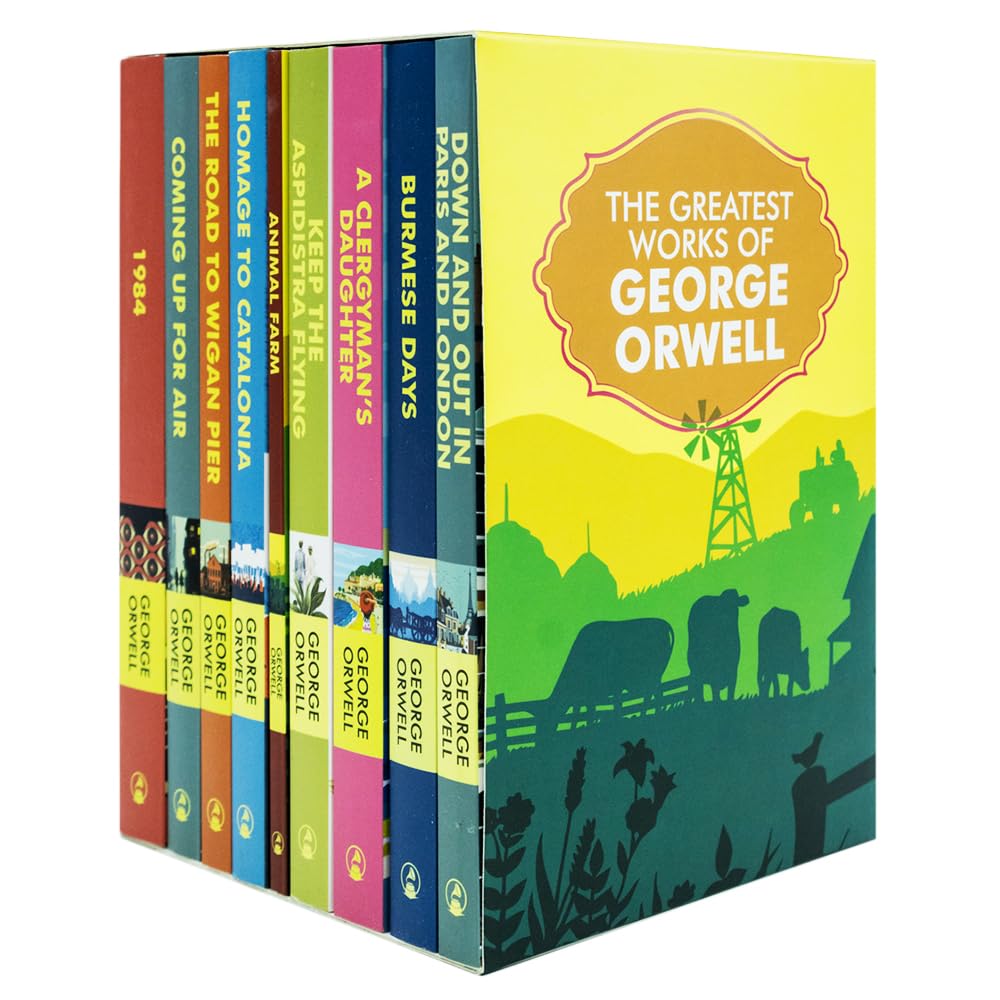





Title in This Set:
1984
Animal Farm
Homage to Catalonia
The Road to Wigan Pier
Down and Out in London and Paris
Burmese Days
A Clergyman's Daughter
Keep The Aspidistra Flying
Coming Up For Air
Condition: BRAND NEW
Format: Paperback
ISBN: 9781804456194
George Orwell, a literary luminary of piercing social commentary and astute political scrutiny, crafted a corpus of timeless classics that continue to reverberate through the corridors of literature. Within his thought-provoking repertoire lie seminal titles that dissect the human condition, societal structures, and the perils of unchecked authority.
"Nineteen Eighty-Four" stands tall as a dystopian masterpiece, an unsettling prophecy of a totalitarian future where the omnipotent Big Brother wields absolute control, probing the depths of surveillance, manipulation, and the erosion of truth.
"Animal Farm" is an allegorical tour de force, employing a farmyard setting to illuminate the pitfalls of political ideologies, encapsulating the Russian Revolution's complexities and the corrupting influence of power.
"Burmese Days" delves into the colonial past, painting a vivid picture of British imperial rule in Burma, unraveling the tensions and moral ambiguities inherent in such dominance.
"A Clergyman's Daughter" navigates the journey of a disillusioned young woman through the societal constraints of early 20th-century England, grappling with identity, faith, and societal expectations.
"Keep the Aspidistra Flying" probes the conflict between artistic integrity and societal conformity, tracing the tribulations of a struggling writer, Gordon Comstock, who wrestles with his aspirations and the trappings of materialism.
"Coming Up for Air" ventures into the thematic territory of nostalgia and the changing landscapes of pre-World War II England, as protagonist George Bowling grapples with the yearning for a simpler past amid encroaching modernity.
"Homage to Catalonia" recounts Orwell's firsthand experience fighting in the Spanish Civil War, providing a raw and unvarnished glimpse into the complexities of the conflict and the disillusionment with political factions.
"The Road to Wigan Pier" acts as a sociopolitical investigation, documenting Orwell's exploration of the working-class living conditions in northern England during the 1930s, exposing stark disparities and societal injustices.
"Down and Out in London and Paris " chronicles Orwell's poignant and candid experiences living among the destitute, laying bare the harsh realities of poverty and the struggle for survival in two major European capitals.
Each title encapsulates Orwell's unyielding commitment to truth-telling, moral introspection, and an unflinching gaze upon the complexities of human nature, leaving an indelible mark on literature that endures through the ages.
About the author
George Orwell is one of England's most famous writers and social commentators. Among his works are the classic political satire Animal Farm and the dystopian nightmare vision Nineteen Eighty-Four. Orwell was also a prolific essayist, and it is for these works that he was perhaps best known during his lifetime. They include Why I Write and Politics and the English Language. His writing is at once insightful, poignant and entertaining, and continues to be read widely all over the world.
Eric Arthur Blair (George Orwell) was born in 1903 in India, where his father worked for the Civil Service. The family moved to England in 1907 and in 1917 Orwell entered Eton, where he contributed regularly to the various college magazines. From 1922 to 1927 he served with the Indian Imperial Police in Burma, an experience that inspired his first novel, Burmese Days (1934). Several years of poverty followed. He lived in Paris for two years before returning to England, where he worked successively as a private tutor, schoolteacher and bookshop assistant, and contributed reviews and articles to a number of periodicals. Down and Out in Paris and London was published in 1933. In 1936 he was commissioned by Victor Gollancz to visit areas of mass unemployment in Lancashire and Yorkshire, and The Road to Wigan Pier (1937) is a powerful description of the poverty he saw there.
At the end of 1936 Orwell went to Spain to fight for the Republicans and was wounded. Homage to Catalonia is his account of the civil war. He was admitted to a sanatorium in 1938 and from then on was never fully fit. He spent six months in Morocco and there wrote Coming Up for Air. During the Second World War he served in the Home Guard and worked for the BBC Eastern Service from 1941 to 1943. As literary editor of the Tribune he contributed a regular page of political and literary commentary, and he also wrote for the Observer and later for the Manchester Evening News. His unique political allegory, Animal Farm was published in 1945, and it was this novel, together with Nineteen Eighty-Four (1949), which brought him world-wide fame.
It was around this time that Orwell's unique political allegory Animal Farm (1945) was published. The novel is recognised as a classic of modern political satire and is simultaneously an engaging story and convincing allegory. It was this novel, together with Nineteen Eighty-Four (1949), which finally brought him world-wide fame. Nineteen Eighty-Four's ominous depiction of a repressive, totalitarian regime shocked contemporary readers, but ensures that the book remains perhaps the preeminent dystopian novel of modern literature.
Orwell's fiercely moral writing has consistently struck a chord with each passing generation. The intense honesty and insight of his essays and non-fiction made Orwell one of the foremost social commentators of his age. Added to this, his ability to construct elaborately imaginative fictional worlds, which he imbued with this acute sense of morality, has undoubtedly assured his contemporary and future relevance.
George Orwell died in London in January 1950.
- Choosing a selection results in a full page refresh.